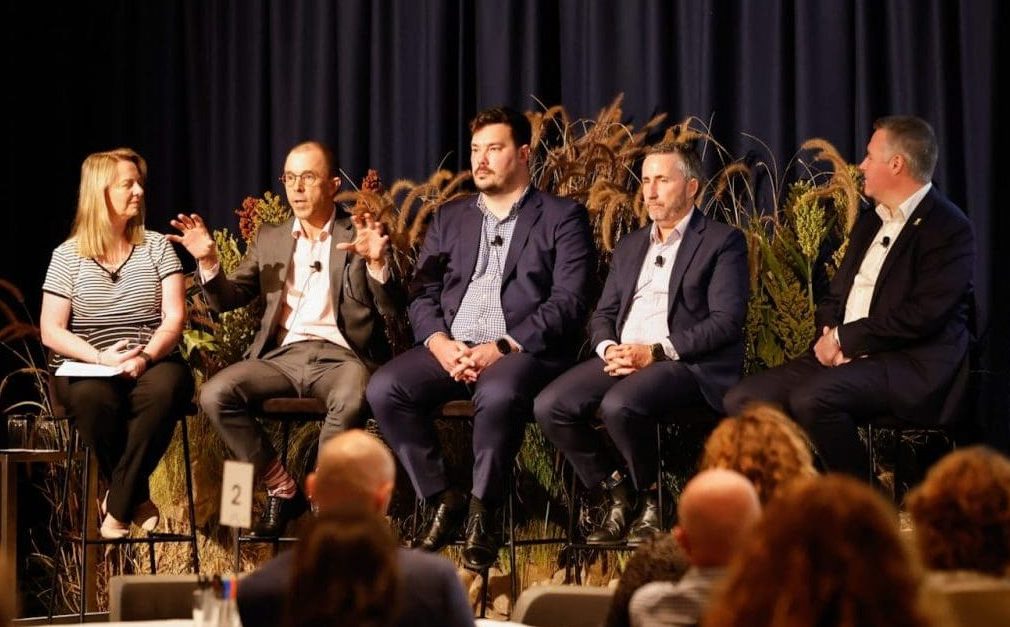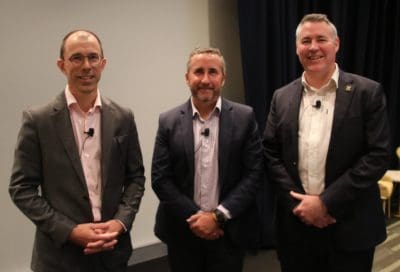
Commonwealth Bank agribusiness general manager Natasha Greenwood, Neste ‘s Darcy Davis, Boeing’s Robert Boyd, CANEGROWERS chief executive officer Dan Galligan and GrainGrowers advocacy and rural affairs manager Sean Cole. Photo: EvokeAg
AN INTERNATIONAL biofuel producer and an aircraft manufacturer have called on all levels of government to introduce policies needed to drive investment in a domestic low-carbon liquid fuel (LCLF) industry.
Global biofuel producer Neste, and potential volume user of sustainable aviation fuel, Boeing, have named Australian regulation and lack of demand-side and supply-side policy as key barriers stopping international companies from investing in domestic refiners.
Speaking at the AgriFuture Australia’s EvokeAg event held at Brisbane last week, Neste lead supply manager ANZ Darcy Davis and Boeing’s Asia Pacific head of global sustainability policy and partnerships Robert Boyd, agreed Australia had ample supplies of feedstock required to sustain a domestic LCLF industry, but more was needed to take up the opportunity to value-add on-shore.
Australia grows on average about 5 million tonnes of canola with about 3Mt of that exported to Europe to be turned into biofuel.
Australia also exports significant volumes of tallow, much of it destined to supply renewable fuel plants.
In addition, Australia produces about 30Mt of sugarcane which can be used in renewable fuel production, and has potential to use or develop novel feedstocks such as crop residues, and pongamia and agave oils.
“It’s observed from all around the world that there is a feedstock pool, a big one, sitting in Australia,” Mr Boyd said.
“There is enough in this country to satisfy basically all of the jet fuel needs in the country.”
Given the significant feedstock supply, Mr Boyd said it would be “a big, missed opportunity if Australia doesn’t get their hands around this” and develop a domestic manufacturing industry.
“This is happening, whether Australia participates or not.”
Mr Boyd said the oneworld Alliance, which comprises 13 of the world’s largest airlines, in 2021 committed to make SAF 10 percent of combined fuel volumes by 2030.
He said this pledge and others may create “organic demand” for biofuels, but lawmakers had to “step in quickly” to create the environment required to promote investment.
“The ingredients are there on the table.
“The key’s in the door and) what will turn that key will be a policy; it’s as simple as that.
“We’ve got to turn that key with a demand-side and supply-side policy, and you will see money flowing to Australia.

Boeing regional head (Asia Pacific: Global Sustainability Policy & Partnerships), Robert Boyd, CANEGROWERS chief executive officer Dan Galligan and GrainGrowers advocacy and rural affairs manager Sean Cole.
Neste produces biofuels from tallow, used cooking oils, and other feedstocks at refineries in Helsinki, Rotterdam, and Singapore, as well as through a joint venture in California.
Mr Davis said it was a “sad picture” to see Australian feedstocks exported to other countries for refining.
“We all understand the potential that we got here in Australia,” Mr Davis said.
“We’re basically a demand-driven market and that’s allowed us to have investments in US and also in Singapore and in Europe and…what we really like is predictable demand.”
Local mandates unmet
Mr Davis said current mandates or “demand-side” measures in Australia were not being implemented as intended and were easily sidestepped.
In Queensland, service stations must ensure ethanol accounts for 4pc of total regular and ethanol-blended petrol sales, while in New South Wales, fuel retailers must ensure ethanol makes up at least 6pc of all petrol sold, and biodiesel at least 2pc of all diesel sales.
However, several reviews since these regulations were introduced have demonstrated that these levels have never been met.
Mr Davis said governments needed to step in to ensure the “predicable demand” required to promote international investment.
“I think we need to make a choice on whether we’d put in some kind of mandate or whether that would be a tax incentive, to push these things along.
“We’ve done a lot of the work, so we now have the ability to pick and choose which settings we want.
“It’s just about creating the feasibility and demand so that we can make the right choices as a country and send the right signals to those who have to find the money to invest.”
Grain, sugar keen for opportunities
Alongside Mr Davis and Mr Boyd, GrainGrowers advocacy and rural affairs manager Sean Cole and CANEGROWERS chief executive officer Dan Galligan told the audience their respective industries were keen to work with the LCLF industry to supply feedstocks required, as well as deliver positive returns for growers and farming communities.
Mr Cole said the biofuels industry offered a strong “market diversification” opportunity for the grains industry.
He said with the need to ensure Australia’s “fuel security” into the future, expanding oilseed crush capacity was a key to enabling a domestic LCLF industry.
“The crush capacity we’ve got is over a million tonnes,” Mr Cole said.
“We need to get that up to several more million tonnes.”
Mr Galligan said CANEGROWERS had partnered with GrainGrowers and the Australian Sugar Milling Council in calling for a national feedstock strategy to create a coordinated approach to drive the cultivation and collection of the raw material required for domestic manufacturing.
He said sugarcane was uniquely positioned to support the sector, as sugar, molasses, and bagasse could all be used to produce LCLFs.
“The opportunity is across the entire supply chain for sugarcane,” Mr Galligan said.
“It’s a huge potential opportunity for the industry, but I think we have to respect the fact that the industry already using all those products.
“We have to work hard to bring together and aggregate it as a feedstock ready for a new industry.”

HAVE YOUR SAY